Challenges in policing: Seized vehicles rotting under police watch
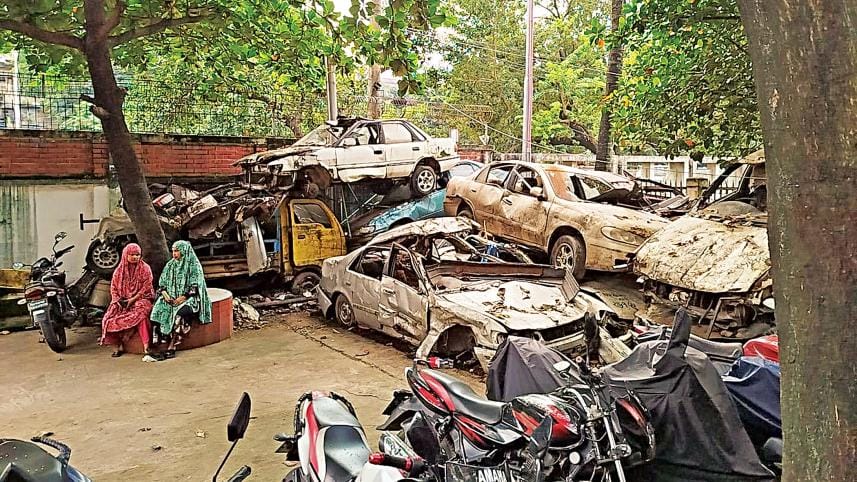
After six years of legal procedures and waiting, Oman expatriate Morium Akter returned home in early August to reclaim her private car from Kafrul Police Station.
On August 23, she went to the station with a court order permitting the car's release. But when officers showed her the vehicle, she was stunned -- it was completely damaged, flattened, stripped of its parts, with three other cars stacked over it.
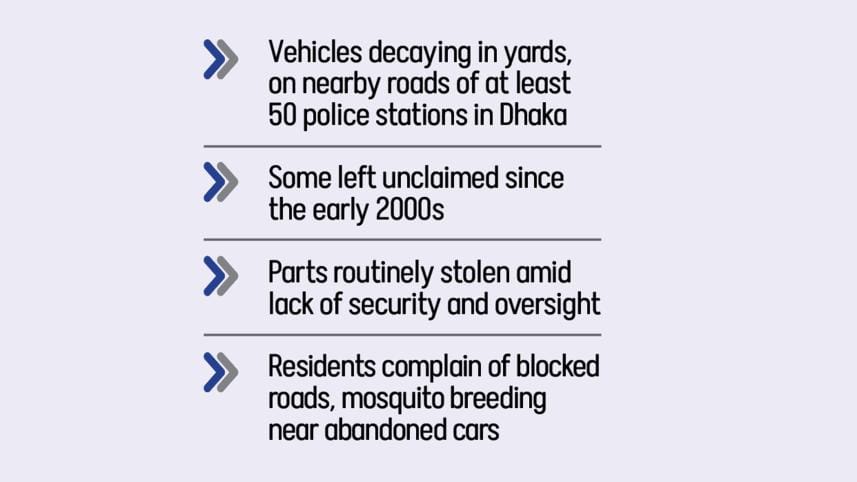
"It was unrecognisable. If I had known its condition, I wouldn't have gone through so much trouble to reclaim it," she said.
Part 1 - Challenges in Policing: Police stations buckling under budget strain
Part 2 - Challenges in Policing: Living conditions appalling at some police barracks
Part 4 - Burnt stations hindering probes
Morium spent about a month visiting the court, BRTA, and lawyers' offices, spending around Tk10,000–12,000 to complete the paperwork. "But when mechanics examined the car, they said it could not be repaired."
She added, "The entire interior was gone. Mechanics at Dholaikhal said the parts had been stolen long ago and advised me to sell it for scrap, worth only Tk6,000–8,000."
She had bought the second-hand Toyota Corolla nine years ago for Tk7.5 lakh.
In 2019, while she was abroad, the car was seized after being used in an attempted abduction by a renter and stored at the police station as evidence. Her husband, Mohammad Hanif, repeatedly contacted the police and court but was told only the owner could reclaim it -- prompting Morium's return.
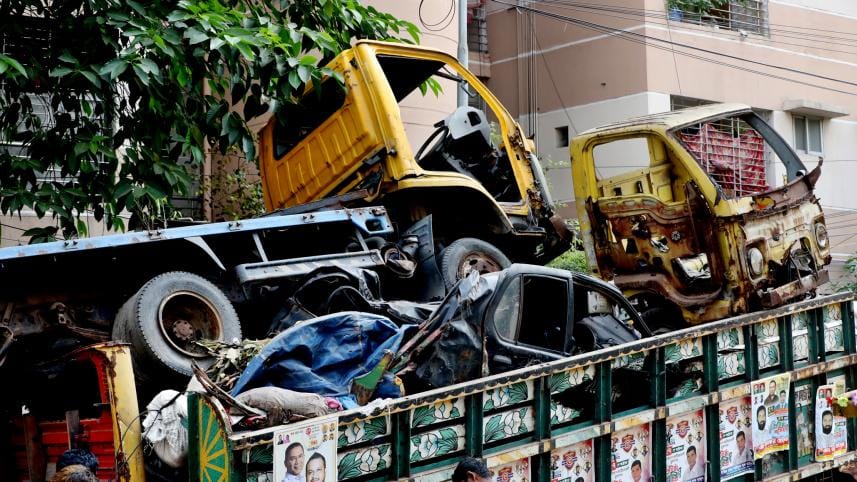
Sub-Inspector Afzal Hossain, store-in-charge at Kafrul Police Station, said they currently have 19 private cars, 30 motorcycles, three pickups, one bus, and three autorickshaws in custody -- some kept there since 2000.
"Many cannot be handed over due to administrative complications. They remain exposed for years, damaged by rain and heat. Dust and mosquitoes gather around them, but we have nowhere else to store them."
Visiting the police station on October 7, this newspaper found vehicles stacked one over another due to a lack of space. Most were crushed under the weight of others, and many had no tyres, windows, or intact body structures.
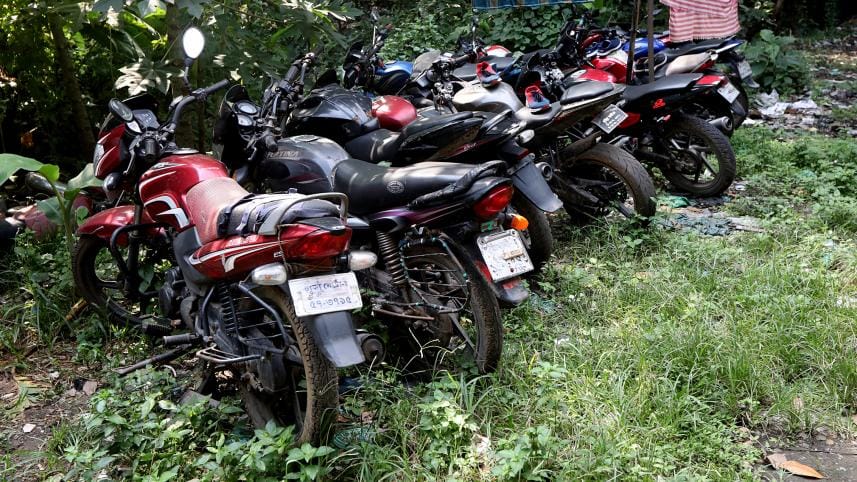
The situation is similar in almost 50 police stations in the capital -- where seized vehicles kept as evidence in criminal or traffic cases have been left to rot for years.
Sub-Inspector Ariful Islam of Shah Ali Police Station said they have seven such vehicles, four of which are completely broken. "The owners of three cars visit sometimes, but they can't take them back without full documentation."
Due to space shortages, station officials have kept the seized vehicles on the footpath. Motorbikes and other vehicles were also found on the road during a visit by The Daily Star on October 8.
Golam Azam, officer-in-charge of the station, said, "The station is small, so they kept some vehicles on the street. We also don't have enough manpower to guard the damaged vehicles."
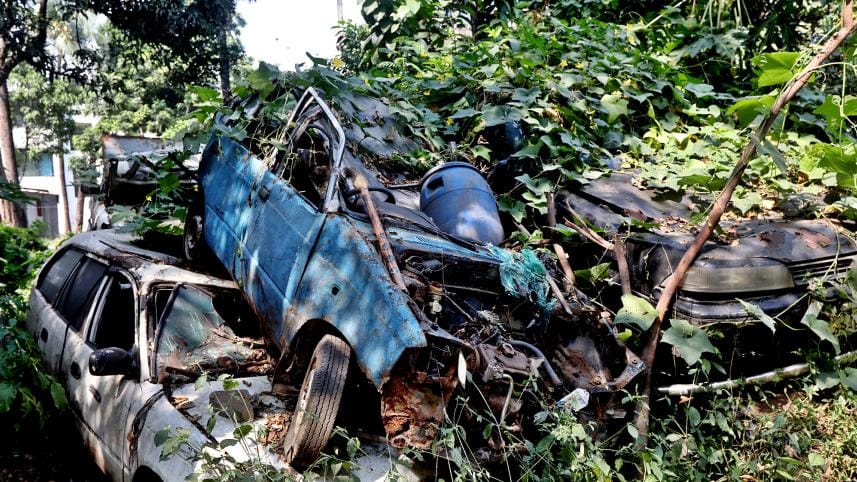
According to locals, thieves and homeless children are often seen around the abandoned cars. "At night, some people come and remove parts. Some sleep inside them," said a resident.
Meanwhile, some vehicles parked on the roads have become public nuisances and breeding grounds for mosquitoes.
At Banani Police Station, around 38 cars, several motorbikes, and a pickup occupy five roads around the premises. The 20-foot-wide road in front of the station is lined with two rows of abandoned cars, causing daily traffic jams.
When The Daily Star visited on October 10, pedestrians and drivers complained. "Why don't the police remove them? They block half the road," said a passerby.
Resident Abdur Rahim said the problem worsens in the evening when traffic increases.

Officer-in-Charge of Banani Police Russell Sarwar said, "These cars are court evidence and cannot be removed without a court order. It has become a burden for us. Traffic authorities also ask us to move them, but we can't."
He added that in his 14 months at the station, no owner had returned with valid court papers to reclaim their vehicle.
"We often receive calls through the 999 hotline asking us to remove the cars. Residents living on the streets where these vehicles are stored complain and pressure us to clear them, but we can't do anything without court orders," the OC said.
Anisur Rahman, joint commissioner (traffic-admin and planning) of Dhaka Metropolitan Police, said they have no designated impound lots or dumping stations, so vehicles are kept at police compounds or nearby roads.
"We use four temporary grounds -- Shahbagh, Bosila, Postagola, and Uttara police line. We've applied for at least four permanent dumping stations. The situation will improve when we get them," he said.
The Shahbagh dumping ground, where seized vehicles from different divisions are kept, presents a grim picture. The open field has no boundary wall, and pools of water and mud make it nearly inaccessible. People can walk in freely; some are seen removing car batteries, tyres, or other parts. Only one police constable sits at the gate, often occupied with other work.
Constable Mohammad Rakib said that approximately 150 autorickshaws, a few buses, and several motorcycles are stored there. "We work in three shifts, but only one constable is present per shift. There is no security inside. People come in, claim a car as theirs, and take parts away. We cannot stop them as we lack manpower."
During a visit on October 8, a 30-year-old man was seen removing tyres from an autorickshaw. When approached, he identified himself as Nur Mohammad. He said it was his vehicle, seized by traffic police. When he came to pay the fine, he found the tyres missing, so he was taking what was left.
Another man, Al Amin, was also seen removing his car battery and seats to save them from theft. "If we do not take the parts, they will be stolen."
Asked about these incidents, Constable Rakib said, "Our superiors told us to check papers when someone comes to reclaim a vehicle. Beyond that, we cannot do anything."
On reports of theft from the dumping ground, DMP Joint Commissioner Anisur said, "We'll try to install boundaries and lighting to prevent such incidents."
The problem is structural -- lack of space, limited manpower, and bureaucratic delays.
Senior officers concede the system is broken. "Due to a shortage of designated dumping grounds, seized vehicles remain as evidence until trials end. We can't release or auction them without court orders," said one official.
"There is a provision for auctioning, but delays make it nearly impossible. Meanwhile, cars rot, parts are stolen, and the value is lost."
Asked about stolen parts and damaged vehicles in police custody, Hasan Md Shawkat Ali, additional commissioner (logistics, finance, and procurement) of DMP, said they had limited resources and refused to elaborate.
Additional Public Prosecutor Md Samsuddoha Sumon said the courts have no impound lots for seized cars. "After trial completion, police can remove those with court orders."
However, he added that police could act proactively by submitting reports to courts in time to release vehicles from custody.
Meanwhile, Morium Akter's ordeal sums up the human cost. "My Tk7.5 lakh car is gone. Nobody is taking responsibility. There's no compensation nor accountability."





 For all latest news, follow The Daily Star's Google News channel.
For all latest news, follow The Daily Star's Google News channel.
Comments